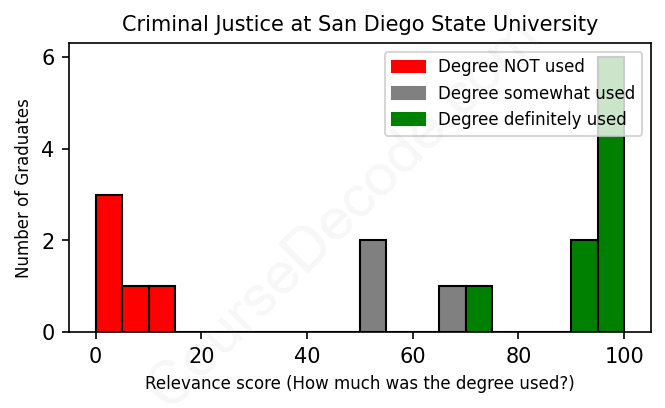
First, some facts. Of the Criminal Justice graduates from San Diego State University we've analyzed , here's how many have used (or NOT used) their degree in their career:

These are estimates based on AI analysis of 17 LinkedIn profiles (see below).
The verdict? Below average. Overall, with an average relevance score of 61%, Criminal Justice graduates from San Diego State University have a lower likelihood (-6%) of finding work in this field compared to the average graduate across all fields:
And for comparison, here's the chart for all profiles we've looked at across all degrees.
Also, after graduating, 58% of these graduates have pursued further education other than another Bachelor's degree (such as a Masters degree or other), compared to the average across all profiles of 35%. This suggests you may need more than just a Bachelors degree to be competitive as a Criminal Justice graduate.
See the details:
|
Relevance score: 100% We think this person has gone into a career highly relevant to their degree. We think this person has gone into a career highly relevant to their degree.
DEGREE INFOGraduated in 2022 from San Diego State University with a Bachelor's degree in Criminal Justice. Also pursued further education since (see below). JOB HISTORY SINCE GRADUATIONLegal Office Assistant Hall Booth Smith, P.C. Feb 2023 - Present FURTHER DEGREES DONE SINCE GRADUATINGJuris DoctorateBelmont University 2023 - 2027 ABOUTGraduated Summa Cum Laude from San Diego State University with a Bachelor's Degree in Criminal Justice and a minor in Cognitive and Behavioral Psychology. I work in the legal environment as an Office Assitant at a local Denver law firm. I am simultaneously working towards entering law school to become a lawyer. Outside of my legal aspirations, you can find me scuba diving, reading, or traveling! |
The top 10 most common jobs done by the graduates we've analyzed (ranked most common to least) are:
The graduates from San Diego State University's Criminal Justice program have pursued a wide range of jobs, but many of them tend to cluster around certain core fields, primarily within law enforcement, legal services, and emergency management. For instance, numerous alumni have taken roles as legal assistants, attorneys, and in emergency services, where their background in Criminal Justice is not just useful but essential for their day-to-day responsibilities. Positions like Deputy Public Defender, Judge Advocate in the Marine Corps, and various roles with the County of San Diego particularly highlight the relevance of their education, as these jobs directly engage with legal frameworks, public safety, and community support systems that are central to the Criminal Justice field. Additionally, military roles within the Army often involve leadership and operational management that hinge on Criminal Justice principles, showcasing how this degree can transcend traditional boundaries of the field.
However, it's interesting to note that not all of the job placements align with the Criminal Justice focus. A significant portion of graduates have found themselves in positions that are only tangentially related or completely unrelated to their studies. For example, roles like sales manager, operations supervisor, and various clerk positions tend to focus more on administrative or retail functions, leaving behind the specialized knowledge of Criminal Justice. Across the board, while many of these positions leverage interpersonal skills, crisis management, and organizational capabilities that are certainly valuable, they fall short of engaging with the core concepts of criminal laws, procedures, or criminal behavior analysis. Overall, while there are strong examples of relevant career paths, there's also a notable amount of graduates navigating into fields where their Criminal Justice education isn't fully realized or applied, demonstrating a mixed landscape for career outcomes in relation to their degrees.
Here is a visual representation of the most common words in job titles for Criminal Justice graduates (this is across all Criminal Justice graduates we've analyzed, not just those who went to San Diego State University):

When we look at the career trajectories of graduates from San Diego State University with a degree in Criminal Justice, there seems to be a solid mix of roles that align well with their studies, especially in the early years post-graduation. Many of the graduates who come out of this program often dive into positions immediately related to public service, law enforcement, or legal sectors. For example, we see roles like emergency services coordinators, legal assistants, and even positions within the Department of Homeland Security just a couple of years after graduation. This trend shows that these early roles are not just jobs; they reflect a commitment to serving in fields that tie back to their education.
Fast forward 5 to 10 years, and most of these graduates continue to progress within the realm of Criminal Justice or related fields. Many have carved out solid paths as attorneys, emergency services managers, and even operational roles in organizations like the U.S. Army or local government offices. It's encouraging to see a good number transitioning into more advanced roles like public defenders, attorneys, and even safety directors. Of course, there are some graduates whose careers veer off into less directly related fields, like retail management or general office roles, but overall, a significant portion stays tied to their Criminal Justice roots, reflecting a strong career foundation built on their academic background. So, while not every graduate may find their dream job immediately, many certainly seem to be making a substantial impact in relevant careers over the years.
A Bachelor's degree in Criminal Justice at San Diego State University is generally considered to be on the manageable side, especially compared to some other majors that might dive deeper into science or math. You’ll definitely have your share of essays, research projects, and exams, but many students find the content interesting and relatable since it ties into real-world issues. It’s not a walk in the park—there's still a fair amount of reading and writing involved—but if you’re motivated and enjoy topics like law, sociology, and psychology, you might actually find it pretty engaging. So, while it has its challenges, it’s not the toughest degree out there, and a lot of students do well with some focus and effort.
Most commonly, in the LinkedIn profiles we've looked at, it takes people 4 years to finish a Bachelor degree in Criminal Justice.
Looking at these Criminal Justice grads from San Diego State University, it seems like they've had a pretty mixed bag when it comes to making decent money. The ones who went straight into military roles, like the Army officers, likely pulled in a solid income, especially as they moved up the ranks. Meanwhile, those stuck in entry-level positions at companies like Starbucks or started as interns might not be raking in as much. Some, like the Associate Attorneys, probably started to see better salaries down the road, but others, especially in more administrative roles, might be earning less than you'd expect for a college degree. Overall, it seems like they’re building their careers, but the pay probably fluctuates quite a bit depending on the path they've taken.
Here is a visual representation of the most common words seen in the "about" section of LinkedIn profiles who have a Bachelor degree in Criminal Justice (this is across all Criminal Justice graduates we've analyzed, not just those who went to San Diego State University). This may or may not be useful:

Here are all colleges offering a Bachelor degree in Criminal Justice (ordered by the average relevance score of their Criminal Justice graduates, best to worst) where we have analyzed at least 10 of their graduates: